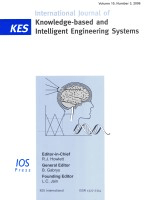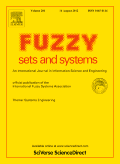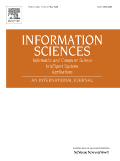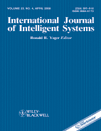
Fuzzy Information and Engineering
Scope & Guideline
Exploring Interdisciplinary Insights in Fuzzy Engineering
Introduction
Aims and Scopes
- Fuzzy Logic and Systems:
The journal focuses on the development and application of fuzzy logic theories and systems, exploring their role in modeling uncertainty and imprecision in various domains. - Decision-Making Methodologies:
A significant area of research involves multi-criteria decision-making (MCDM) techniques that incorporate fuzzy sets and soft computing methods to enhance decision quality in complex scenarios. - Algebraic Structures and Topology:
Research in this area examines the mathematical foundations of fuzzy sets, including developments in algebraic structures and topological properties, contributing to a deeper understanding of fuzzy mathematics. - Applications in Engineering and Technology:
The journal publishes studies that apply fuzzy logic to solve real-world engineering problems, including control systems, optimization, and data analysis, showcasing practical implementations of theoretical concepts. - Interdisciplinary Research:
The journal encourages interdisciplinary studies that combine fuzzy logic with fields such as computer science, biomedical engineering, and economics, fostering innovative research connections.
Trending and Emerging
- Machine Learning and Fuzzy Systems:
There is a notable increase in research that integrates machine learning techniques with fuzzy logic, particularly in areas like fuzzy regression and classification, demonstrating the potential for enhanced predictive capabilities. - Neutrosophic Logic Applications:
The application of neutrosophic logic, which extends fuzzy logic to handle indeterminacy, is gaining traction, particularly in complex decision-making scenarios and data analysis, reflecting its relevance in modern research. - Granular Computing:
Emerging themes related to granular computing indicate a growing interest in processing and analyzing information at various levels of granularity, enhancing the flexibility and applicability of fuzzy systems. - Biomedical Applications:
Research focusing on the application of fuzzy logic in biomedical fields, particularly in modeling and analyzing complex biological systems, is on the rise, highlighting the importance of fuzzy methodologies in healthcare. - Dynamic Decision-Making Models:
There is an increasing trend towards the development of dynamic and adaptive decision-making models that incorporate fuzzy logic, reflecting the need for systems that can respond to changing environments and data.
Declining or Waning
- Classical Fuzzy Set Theory:
There appears to be a decrease in publications solely focused on traditional fuzzy set theory, as researchers increasingly explore hybrid models that combine fuzzy logic with machine learning and other computational techniques. - Basic Fuzzy Operations:
Research centered on fundamental operations within fuzzy systems, such as basic fuzzy arithmetic, has become less frequent, indicating a shift towards more complex and integrated methodologies. - Static Modeling Approaches:
The use of static models in fuzzy applications is declining, with a growing preference for dynamic and adaptive models that account for real-time changes and uncertainties in data.
Similar Journals

International Journal of Mathematics and Computer Science
Unlocking Insights at the Intersection of Math and TechnologyThe International Journal of Mathematics and Computer Science (ISSN: 1814-0424, E-ISSN: 1814-0432), published by Lebanese University, serves as a vital platform for disseminating innovative research and advancements in the fields of mathematics and computer science. With a compelling range of topics including Algebra, Applied Mathematics, Computational Mathematics, and Statistical Analysis, this journal caters to a broad audience of researchers, professionals, and students. Spanning the years from 2017 to 2025, it has established a presence in several key quartiles, including Q3 rankings in Applied Mathematics and Computational Mathematics, and a Q4 ranking in Algebra and Number Theory. While currently not an open-access journal, it provides valuable insights through its rigorous peer-reviewed process, enhancing its relevance in both theoretical and applied domains. Furthermore, its presence in Scopus rankings reflects its commitment to quality, making it an essential resource for anyone looking to explore the intersection of mathematics and computer science.

Mathematical Foundations of Computing
Exploring Theoretical Insights for Modern ComputingMathematical Foundations of Computing, published by the American Institute of Mathematical Sciences (AIMS), is a distinguished open-access journal that has been actively disseminating influential research in the fields of Artificial Intelligence, Computational Mathematics, Computational Theory and Mathematics, and Theoretical Computer Science since its inception in 2009. With its E-ISSN 2577-8838, this journal is committed to providing researchers and practitioners with cutting-edge mathematical theories and methodologies that underpin modern computational practices, which is critical for advancing the field. The journal proudly holds a Q3 categorization in several relevant domains as of 2023, reflecting its contribution and accessibility amid an evolving academic landscape. By offering open access to its content, it ensures that vital research is freely available to a global audience, enhancing collaboration and innovation. Positioned in the heart of the United States, Mathematical Foundations of Computing serves as a crucial resource for advancing knowledge and fostering discussions among researchers, professionals, and students passionate about the mathematical underpinnings of computing.

INTERNATIONAL JOURNAL OF APPROXIMATE REASONING
Leading the Charge in High-Impact ResearchThe INTERNATIONAL JOURNAL OF APPROXIMATE REASONING, published by Elsevier Science Inc, stands as a pivotal resource in the domains of applied mathematics and artificial intelligence. Since its inception in 1987, the journal has evolved into a leader in its field, boasting an impressive impact factor and ranking within the top quartile for applied mathematics (Q1) and high standings in artificial intelligence and software categories according to the 2023 Scopus rankings. As researchers, professionals, and students delve into complex issues surrounding reasoning under uncertainty, this journal provides invaluable insights and cutting-edge research. In addition to its rich content, the journal's commitment to advancing knowledge in theoretical computer science further enhances its significance in fostering academic growth. While the journal does not currently offer open access, its rigorous peer-review process ensures that only high-quality, impactful studies are published, solidifying its role as an essential source for academics striving to remain at the forefront of their fields.

International Journal of Knowledge-Based and Intelligent Engineering Systems
Exploring the Synergy of AI and Engineering ExcellenceThe International Journal of Knowledge-Based and Intelligent Engineering Systems, published by IOS PRESS, serves as a vital platform for scholars and practitioners involved in the fields of Artificial Intelligence, Control and Systems Engineering, and Software Development. Founded in 2004 and continuously publishing through to 2024, this journal stands out with its comprehensive coverage of innovative methodologies and applications that leverage knowledge-based systems. Although currently listed in Q4 for Artificial Intelligence and Q3 for Control and Systems Engineering, it features an increasing trajectory in the scientific community, as indicated by its rankings in Scopus—which reflects the growing importance of intelligent engineering systems in contemporary research. With a commitment to disseminating cutting-edge research without open access constraints, this journal is essential for those seeking to understand and contribute to advancements in intelligent systems. Join a global community of researchers and industry leaders by engaging with the latest findings shared in this well-regarded journal.

FUZZY SETS AND SYSTEMS
Bridging Theory and Practice in Fuzzy SetsFuzzy Sets and Systems, published by Elsevier, is a leading international journal that delves into the intricate field of fuzzy logic and its applications in various domains, including artificial intelligence and computational mathematics. With a significant impact within its categories—ranking Q2 in Artificial Intelligence and Q1 in Logic for 2023—this journal offers a robust platform for scholars to share cutting-edge research and developments. Focusing on the application of fuzzy set theory to enhance decision-making processes, modeling, and data analysis, it caters to a diverse audience of researchers, industry professionals, and advanced students. The journal's rigorous review process and prestigious ranking, evidenced by its impressive Scopus metrics—2nd in Mathematics & Logic and 120th in Computer Science—underscore its importance in the academic landscape. Contributors are encouraged to explore innovative methodologies, theoretical advancements, and interdisciplinary approaches. Fuzzy Sets and Systems continues to serve as a vital resource for advancing knowledge and fostering collaboration within the fuzzy logic community.

INFORMATION SCIENCES
Unveiling Insights in Information SystemsINFORMATION SCIENCES, published by Elsevier Science Inc, is a premier peer-reviewed journal that has become instrumental in advancing the field of information science since its inception in 1968. With an impressive array of quartile rankings in 2023, including Q1 in Artificial Intelligence, Computer Science Applications, Control and Systems Engineering, Information Systems and Management, Software, and Theoretical Computer Science, this journal serves as a vital resource for researchers and professionals looking to explore cutting-edge theories and practical applications within these domains. The journal is indexed extensively, with notable Scopus rankings, reflecting its significance and influence in the academic community—ranked 6th in Theoretical Computer Science and 10th in Information Systems and Management, among others. Although it does not currently offer an open-access option, the depth of research published within INFORMATION SCIENCES ensures that it remains a key reference point for advancing academic inquiry and addressing complex challenges in the information landscape.

Fuzzy Optimization and Decision Making
Innovating Solutions in Artificial Intelligence and OptimizationFuzzy Optimization and Decision Making, published by Springer, is a prestigious academic journal that has made significant contributions to the fields of Artificial Intelligence, Logic, and Software. With an impressive impact factor and a consistent ranking in the top Q1 quartile across its categories, this journal stands at the forefront of research dissemination in its domain. Established in 2002 and continuing through 2024, the journal focuses on the theoretical and practical aspects of fuzzy optimization methods and their applications in decision-making scenarios. The journal is highly regarded for its rigorous peer-review process and aims to present innovative research findings that inspire advancements in optimization techniques using fuzzy logic. Aimed at researchers, professionals, and students alike, Fuzzy Optimization and Decision Making serves as an essential resource for those looking to stay at the cutting edge of technology and methodology in mathematics and computer science.

INTERNATIONAL JOURNAL OF INTELLIGENT SYSTEMS
Driving Progress in Theoretical Computer ScienceInternational Journal of Intelligent Systems, published by Wiley-Hindawi, stands at the forefront of the Artificial Intelligence, Human-Computer Interaction, Software, and Theoretical Computer Science fields. With an impressive Q1 ranking across multiple categories in 2023 and a robust track record since its inception in 1986, this journal is essential for researchers, professionals, and students alike who are eager to explore cutting-edge innovations and theoretical advancements. Located in the United Kingdom, the journal operates under the esteemed Wiley-Hindawi publishing house, ensuring a broad dissemination of high-quality research articles. The journal's diverse scope encompasses advancements in intelligent systems and their practical applications, fostering an interdisciplinary dialogue that encourages collaboration across various domains. Although Open Access options are not available, subscribers benefit from the rich repository of knowledge this journal offers, making it a vital resource in the rapidly evolving landscape of intelligent technologies.

Archives of Control Sciences
Exploring New Horizons in Control ApplicationsArchives of Control Sciences is a distinguished open access journal dedicated to the field of control sciences, published by the Polish Academy of Sciences. With its ISSN 2300-2611, the journal has been available to the global research community since 2010, ensuring unrestricted access to groundbreaking findings. The journal seeks to present high-quality research covering various aspects of control theory and its applications, appealing to both researchers and practitioners eager to stay at the forefront of innovation. Although specific metrics like the HIndex and category quartiles are currently not listed, the dedication to open access and the backing of a reputable publisher enhances its visibility and accessibility. Located at PL DEFILAD 1, WARSZAWA 00-901, POLAND, the journal invites submissions that contribute to the advancement of knowledge in control sciences, fostering collaboration and the sharing of insights among professionals in the field.

International Journal of Fuzzy Systems
Elevating the Standards of Fuzzy Systems Research and InnovationThe International Journal of Fuzzy Systems, published by SPRINGER HEIDELBERG, is a premier platform for disseminating cutting-edge research in the fields of Artificial Intelligence, Control and Systems Engineering, Computational Theory and Mathematics, and more. With an impressive impact factor reflected in its Q2 category rankings across various domains, this journal serves as a vital resource for researchers, professionals, and students eager to explore the applications of fuzzy logic in solving complex real-world problems. Established in 2004, the journal continues to contribute significantly to theoretical advancements and practical implementations in areas such as information systems and software engineering. The journal does not offer Open Access, ensuring a curated audience of engaged readers and contributors. Its rigorous peer-review process guarantees high-quality publications that resonate within the scientific community. For those interested in the intersection of theoretical insights and practical applications, the International Journal of Fuzzy Systems stands out as an essential venue for knowledge exchange and innovation.